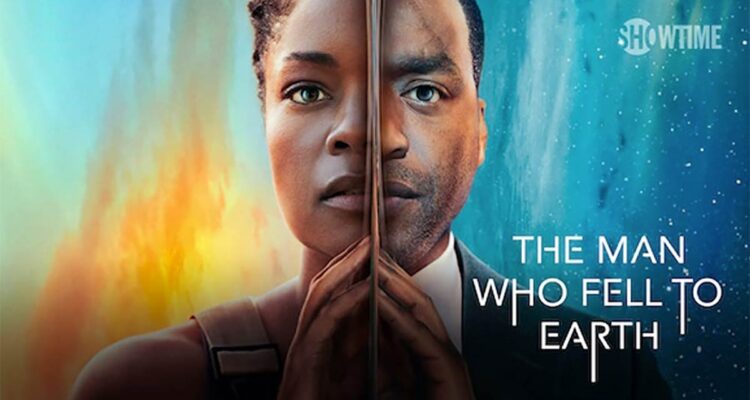In today’s episode of Bingeworthy, our revitalized TV and streaming podcast co-hosts Mike DeAngelo and Rodrigo Perez dive into Showtime’s new sci-fi sequel/reboot series, “The Man Who Fell to Earth” from Alex Kurtzman (“Fringe,” “Alias,” “Star Trek: Discovery”) and Jenny Lumet (“Star Trek: Discovery,” “Rachel Getting Married”). Based on the classic 1976 sci-fi movie from director Nicolas Roeg starring David Bowie, this new “The Man Who Fell to Earth” is essentially a legacy sequel and centers on Faraday (Chiwetel Ejiofor), an alien who comes to Earth with a mission to enlist the help of a human scientist (Naomie Harris) to save his species and, in turn, humanity (read our review here). Bill Nighy takes up David Bowie’s alien role in the series too (yes, the character is still alive).
After our hosts discuss the show, writer/director/producers Alex Kurtzman and Jenny Lumet stop by to discuss heading up a reboot/sequel of a beloved, nearly 50-year-old sci-fi cult classic and the surprisingly personal reasons they chose to do it.
“I realize, thinking about it now, that I’d gone through an enormous amount of personal loss,” Lumet said. “When you lose somebody, the world becomes a new place, the terrain is completely different, and it was hard to get my footing. And I think I wanted to write my way through that, and I knew this material and I knew Walter Tevis’ book, I knew Nicolas Roeg’s extraordinary movie and, of course, David Bowie is David Bowie. And I knew that, with this material, I could write my way through stuff that I needed to write my way through.”
And while Kurtzman’s reasons were not quite as personal, he also felt drawn into making the show for very universal, human reasons.
“At the heart of Tevis’ novel are these central questions about human beings and the choices that we make and the choices that we’re making and what our future stands to become that are, unfortunately, still very relevant now,” Kurtzman said. “And that’s because I think Tevis, who was an extraordinary, extraordinary author, did what all the great science fiction works do, which is use the story as an allegory for the present. Even if you’re writing about the future, you’re really writing about the present. And that’s certainly a lesson I learned from Roddenberry on Trek. And so, my initial reservations gave way to, frankly, a need to answer these questions because we were looking around at the world and what it was becoming and we were not understanding what we were seeing anymore. Things were not making sense to us anymore. So, rather than say let’s write a thing where we have all the answers because we would never pretend to have all of the answers, we were really looking for ways to work through our understanding of these questions that we had.”
The conversation eventually turned to Kurtzman and Lumet’s last and only film collaboration, “The Mummy,” which has become the subject of endless online bashing from critics, film fans, and even those who worked on the film. It became very clear that even Kurtzman himself, who directed the film, had a very troubled relationship with the film.
“I tend to subscribe to the point of view that you learn nothing from your successes, and you learn everything from your failures. And that was probably the biggest failure of my life, both personally and professionally. There are about a million things I regret about it, but it also gave me so many gifts that are inexpressibly beautiful. I didn’t become a director until I made that movie, and it wasn’t because it was well directed – it was because it wasn’t.” Kurtzman said of his experience.
“And as brutal as it was, in many ways, and as many cooks in the kitchen as there were, I am very grateful for the opportunity to make those mistakes because it rebuilt me into a tougher person and it also rebuilt me into a clearer filmmaker,” he continued. “And that has been a real gift and I feel those gifts all the time because I’m very clear now when I have a feeling that doesn’t feel right – I am not quiet about it anymore. I will literally not proceed when I feel that feeling. It’s not worth it to me. And you can’t get to that place of gratitude until you’ve had that kind of experience. Look, if you look at history and you look at people who’ve made amazing things, every single one of them will tell you the same story which is that it came after a failure, so I look back on it now with gratitude. It took me a while to get there, but my life is better for it.”
“The Man Who Fell to Earth” debuts on Showtime on Friday, April 24th. You can listen to the entire podcast below.
Bingeworthy is part of The Playlist Podcast Network, which includes The Playlist Podcast, Be Reel, Deep Focus, The Fourth Wall, The Discourse & more. We can be heard on iTunes, AnchorFM, Soundcloud, Stitcher, Spotify, and most places where podcasts are found. You can stream the podcast via the Spotify embed within the article or click on the lead image at the top page. Follow us on iTunes, and you’ll get this podcast as well as our other shows regularly. Be sure to subscribe and drop us a comment or a rating, as we greatly appreciate it. Thank you for listening.

